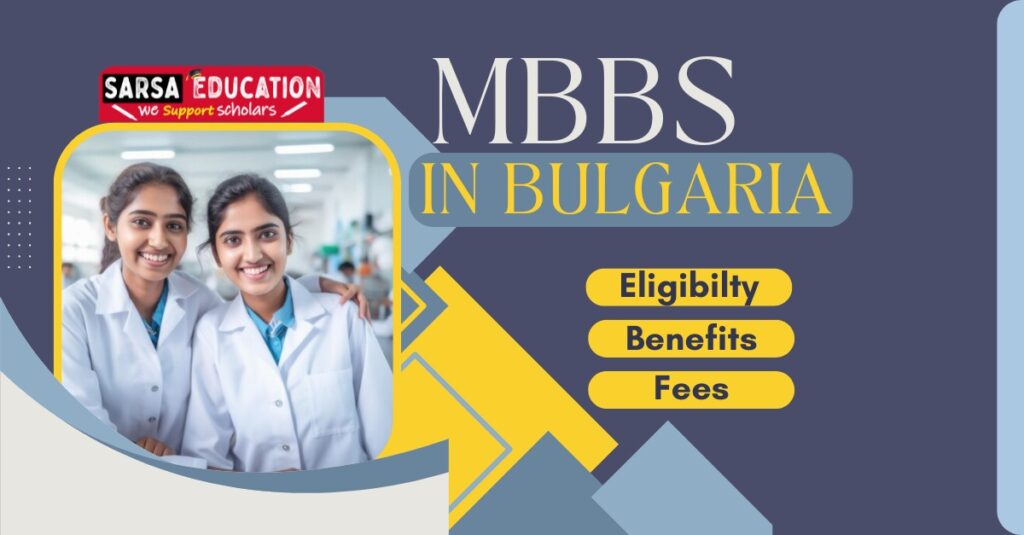MBBS in Bulgaria refers to a 6‑year medical degree program (commonly called MD or Doctor of Medicine there) taught in English at EU‑accredited universities like Sofia, Plovdiv, and Varna. It follows the European Credit Transfer System (ECTS), combining pre‑clinical, clinical studies, and a one‑year internship. These programs are globally recognized—approved by WHO, ECFMG, NMC (India), GMC (UK), and more—making graduates eligible to pursue licensure, postgraduate training, or practice medicine in Europe, India (via FMGE/NExT), and other countries.
Contents
Eligibility Criteria to Study MBBS in Bulgaria
To study MBBS in Bulgaria ,the applicant must meet the following requirements:
- Applicants must have completed 10+2 with Physics, Chemistry, Biology, and English, scoring a minimum 50% in PCB .
- The student must be at least 17 years old (typically with an upper age limit around 25, though some universities may allow older applicants based on merit) .
- For Indian students, qualifying NEET is mandatory to ensure eligibility for practicing in India later .
- Many universities also require English proficiency, often via 12th-grade certification or tests like IELTS/TOEFL, while some may offer internal tests.
- Additionally, students need a valid passport, medical fitness certificate, and must apply for a Bulgarian student visa
Duration of MBBS in Bulgaria
The MBBS (MD) program in Bulgaria has a standardized structure and timeline:
It is a 6-year course, which is divided as follows:
- 2 years of pre-clinical foundational studies
- 3 years of clinical coursework and hospital rotations
- 1 year of compulsory internship in university-affiliated hospitals
Important link:
- Top Scholarships after 12th for Arts, Science & Commerce
- Top 100 Scholarships for B.Com students.
- Top Scholarship for Engineering Students
- Top 100 Scholarships for B.Sc students.
Benefits of Studying MBBS in Bulgaria
Here are the key benefits of studying MBBS in Bulgaria:
1. Affordable Quality Education
- Lower tuition and living costs compared to Western Europe and private colleges in India — around €7,500‑8,500/year and €250‑500/month for living expenses.
- Total 6-year cost (~€45,000–50,000) often comes out cheaper than equivalent programs in many countries .
2. Globally Recognized Degree
- Bulgarian MD is listed by WHO, FAIMER, NMC (India), and GMC (UK) .
- Graduates are eligible to sit for USMLE (USA), PLAB (UK), FMGE/NExT (India), and pursue PG studies in Europe.
3. English-Medium Instruction
- Programs are delivered entirely in English, eliminating the need to learn Bulgarian before enrolling .
- Basic Bulgarian is often taught later to help with patient interaction during clinical years.
4. Strong Clinical Exposure & Infrastructure
- European-standard facilities, modern labs, simulation centres, and hospital affiliations ensure robust clinical training .
5. EU & Schengen Advantages
- Access to freedom of movement and work opportunities across the EU and Schengen area .
- Eligibility for post-study and work visas, plus easier mobility for further education or training in Europe.
6. Safe and Supportive Environment
- Bulgaria ranks high in peace and safety; international students report a welcoming, multicultural atmosphere.
7. Easy Admission Process & No Donations
- No entrance exams or hefty capitation fees; admission primarily based on 10+2 with NEET.
- Streamlined process with quick turnarounds (~90 days to enroll) .
8. Cultural, Academic & Networking Benefits
- Multicultural campuses with diverse student bodies from India, Europe, Africa & the Americas.
- Participation in Erasmus+ exchange programs, research collaborations, and European clinical networks .
Studying MBBS in Bulgaria offers a compelling blend of affordability, recognized qualification, English-based learning, strong clinical exposure, and EU opportunities. It’s a safe, accessible, and strategic pathway to both Indian and international medical careers.
Frequently Asked Questions
- Is the MBBS (MD) degree from Bulgaria globally recognized?
Yes—Bulgaria’s medical colleges are approved by WHO, WDOMS, and according to NMC (India), and graduates can practice in the EU, UK, USA (via USMLE), and India (after FMGE/NExT) . - What is the duration of the MBBS in Bulgaria?
The MD/MBBS equivalent is a 6-year program: 5 years of study + 1-year compulsory internship. - What are the eligibility criteria of MBBS in Bulgaria?
Applicants need 10+2 with Physics, Chemistry, Biology and English; minimum ~50‑62% in PCB (40% for reserved); must be 17+ years old by December 31; and NEET-qualified for Indian students. - Is an entrance exam required to apply for MBBS in Bulgaria?
Many universities conduct local Biology & Chemistry entrance exams, though some admit based purely on marks and NEET. English proficiency (if not from English-medium schooling) may also be tested. - Is NEET mandatory to apply for MBBS in Bulgaria?
Yes—for Indian students aiming to practice in India, NEET qualification is required to obtain an NMC-recognized degree. - How much does it cost annually to study MBBS in Bulgaria?
Tuition ranges from €6,000–8,500/year, plus living expenses (~€3,000–6,000/year), making total around €10,000–15,000/year . - Are scholarships available for MBBS in Bulgaria?
Full scholarships are rare, but merit-based or bilateral scholarships may be available; check university websites . - Is the medium of instruction English of ?
Yes, all lectures and exams are in English. Additionally, Bulgarian classes are mandatory—especially during clinical years—for effective patient communication. - How is the course structured of MBBS in Bulgaria?
Pre-clinical (years 1–2), clinical (years 3–5), and final internship (year 6) . - Is internship mandatory in MBBS in Bulgaria?
Yes, the final year is a compulsory clinical internship conducted in university-affiliated hospitals . - Can students work part-time during MBBS?
Non-EU students face restrictions. EU students may work limited hours depending on visa rules. - What is living in Bulgaria like?
Bulgaria offers a safe, multicultural environment, affordable living (≈ €250–500/month), and active Indian student communities. - Can students cook Indian food or find it nearby?
Yes, shared-hostel kitchens are available, and various Indian restaurants or cooks cater to students. - Can students return to India during holidays?
Yes, a short summer break (typically 2–3 weeks) is given between semesters. - Can I practice in India after MBBS from Bulgaria?
Definitely—provided you pass FMGE or NExT exam to get your license in India . - How about EU & other countries?
Bulgarian MD is valid in EU and UK (via PLAB), and in the USA (via USMLE), allowing for further postgraduate training. - Who studies in Bulgaria?
Students from India, UK (including British‐Asian students), Germany, Italy, and Turkey—all major groups. - Quality & credibility of education?
Opinions vary: EU standards are met, but clinical experience may depend on students learning Bulgarian. Success in PG abroad shows solid fundamentals . - Do I need an agency to apply?
No. Many students apply independently, though agencies can simplify document and visa processing. - What visa/documentation is needed?
Apart from passport and transcripts, students require an Eligibility Certificate from Bulgaria, attested documents, and a student visa via Bulgarian consulate . - Are residencies paid?
Yes—postgraduate specialist training (residency) is typically paid employment in Bulgaria .
For National/International Scholarship updates kindly join our WhatsApp channel
Follow the Sarsa Education channel on WhatsApp: https://whatsapp.com/channel/0029VaL9SgRAjPXJthnK9D0E
In case of any queries, please reach out to:
+91-9156405182 (Monday to Friday – 10:00 AM to 06:00 PM (IST))
For regular Scholarship/Fellowship/Internship updates:
Join our Telegram channel: Sarsa Education







